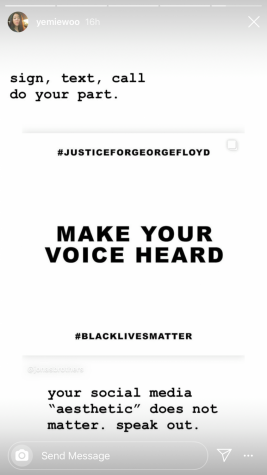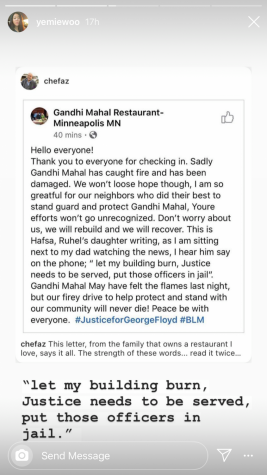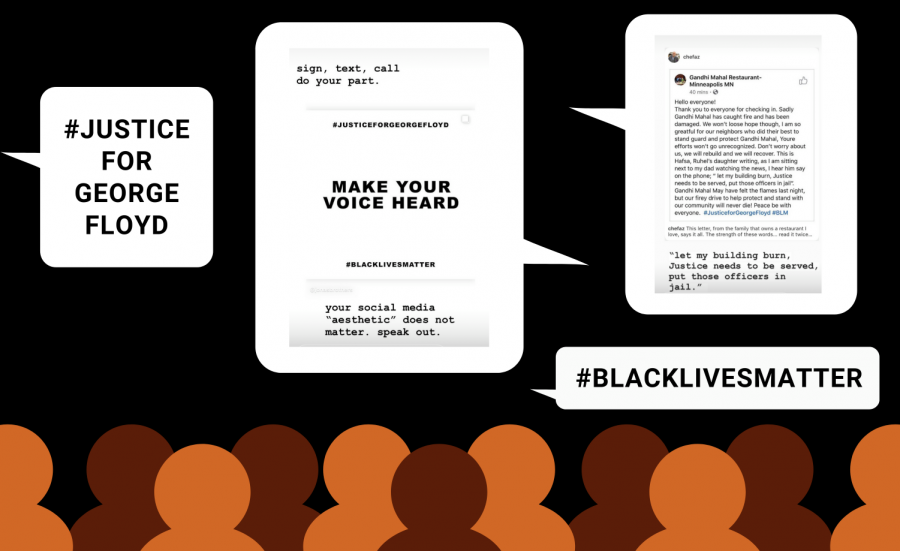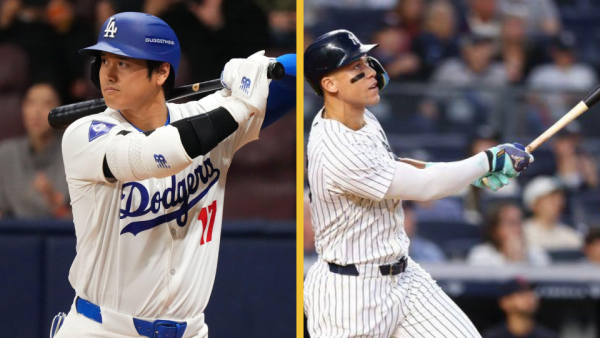Say his name: George Floyd
Editor’s note: The following is an opinion article. The opinions presented are the writer’s own and are not representative of the Trailblazer newspaper staff or Pascack Hills High School.
Instagram story posts from Yemie Woo. Graphic by Jared Mitovich.
Dozens of Hills students of all races have vocalized their concern over issues raised by George Floyd’s death through their Instagram stories.
On May 25, Memorial Day, a 46-year-old Black man named George Floyd was allegedly trying to spend $20 at the Cup Foods, a deli, on Chicago Avenue South in Minneapolis. Convinced that Floyd had been trying to spend a forged bill, the deli store clerk swiftly called the Minneapolis Police Department to alert them of the non-violent offense. From here, the inherent systemic racism of the American police force had other plans in store for him.
“If you look at this from 35,000 feet, this man died over $20. Really? … Why do you think people are so damn angry.” @sarasidnerCNN reflects on the events that led to George Floyd’s death. https://t.co/Rv2Erclw7a pic.twitter.com/qTKjvG79s6
— CNN (@CNN) June 1, 2020
In multiple viral videos, Floyd is seen obediently complying with his arrest as he is escorted to a patrol car. Once inside the patrol car, a newer video displays a shocking image of Floyd being brutally beaten up by several policemen while another stood by and watched. The more infamous video, however, shows Floyd pinned to the ground while white police officer Derek Chauvin places his knee against Floyd’s neck.
“Please, I can’t breathe,” he exclaimed as bystanders listened to his pleas. Still, Chauvin kept applying pressure, effectively killing Floyd within seven minutes.
In many cases of police brutality, there have been attempts to fool the public into sympathizing with the “frightened policeman” arc that not only relieves murderers of responsibility for their actions but perpetuates the long-lived African American stereotype of being reckless and dangerous. This case, however, was a critical, pivotal point in the fight against police brutality; with undeniable video proof that Floyd was unarmed and complicit, the Black Lives Matter Movement rightfully gained an intense wave of momentum.
This is not an isolated incident, nor will it be the last one of its kind. This is largely due to a flaw within the police system itself: by giving power to individuals who, feeling invincible with their unquestionable hero status, consistently abuse said power and often without consequence. In fact, Chauvin has only been charged with murder in the third-degree despite the undeniable video evidence.
In Minnesota, murder in the third degree is committed when there isn’t intent or premeditation. According to a Minnesota statute, “whoever, without intent to effect the death of any person, causes the death of another by perpetrating an act eminently dangerous to others and evincing a depraved mind, without regard for human life, is guilty of murder in the third degree.”
Regardless of the toxic cycle of police brutality, we still try to convince ourselves that these are all the faults of the individuals –– “it was just one bad cop,” we might say. We refuse to believe that the police system, which saves the lives of so many people, can be flawed in its broader composition.
“This blatant racism shows a disregard for human life that shocks me,” expressed Opinion Editor Claudia Kim. “Those responsible need to be blamed as a step to rectify the system and truly allow liberty for all American citizens to prevail.”
This is a system that, at its most corrupt, includes people who defend murderers because they are colleagues and consistently highlight the concept of the “good cop” compromising the majority of the police force as if it makes up for those who murder. This system is not a two-sided scale in which the actions of cops who don’t murder compensate for the wrongdoings of those who do.
Chief Wysocki on the march today, standing together with the residents we serve to remember and honor George Floyd. #StrongerTogether #CamdenStrong pic.twitter.com/UJAjxXkxrx
— Camden County Police Dept. (@CamdenCountyPD) May 31, 2020
Regardless of how many good cops there are –– and there are many –– the failure of the system to condemn those who have committed crimes has effectively created a breach in trust between African Americans and the police that cannot be quickly or easily mended. There are, of course, cops who courageously help people, or march hand-in-hand with those protesting, but this does not erase those who abuse their power; this vast ratio between good cops and bad cops should not be used to avert attention away from police brutality.
Even the cops who don’t beat up or kill suspects unnecessarily are guilty of standing behind a corrupted institution. In fact, the cop who stood and watched his colleagues beat up George Floyd in a patrol car is just as complicit as the perpetrators themselves –– the Minneapolis police chief has even said so.

Dozens of Hills students of all races have vocalized their concern over the issue through their Instagram stories, particularly when it comes to those in power. One example posted widely specifically highlights the difference in dialect President Donald Trump uses when speaking about people of color protesting police brutality as opposed to when speaking about white people protesting imposed quarantines or stay-at-home orders by governors.
As Editor-in-Chief Jared Mitovich explained, “On Thursday night, protests were growing fiery and violent throughout Minneapolis. President Trump tweeted that ‘thugs’ were not being respectful to George Floyd and his family and invoked a phrase that caused Twitter to flag the tweet for ‘glorifying violence’.
“As the tweet gained attention, users of the platform pointed out that Trump had referred to the mostly non-white protesters as “thugs,” but weeks earlier called protesters against stay-at-home orders “very good people” and did not threaten violence against them despite their actions.”
The Governor of Michigan should give a little, and put out the fire. These are very good people, but they are angry. They want their lives back again, safely! See them, talk to them, make a deal.
— Donald J. Trump (@realDonaldTrump) May 1, 2020
….These THUGS are dishonoring the memory of George Floyd, and I won’t let that happen. Just spoke to Governor Tim Walz and told him that the Military is with him all the way. Any difficulty and we will assume control but, when the looting starts, the shooting starts. Thank you!
— Donald J. Trump (@realDonaldTrump) May 29, 2020
For a white person, it is hard to grasp the true anger and disappointment felt by the Black community. Considering that police brutality continues to escalate, the recent reaction is a cultivation of all the pent-up emotions felt over the last few years of constant maltreatment, including the most recent victims by the names of Ahmaud Arbery, Breonna Taylor, Michael Lorenzo Dean, and countless more. Trump is able to sympathize with white protest because he is experiencing the hardships of quarantine himself –– his boisterous rallies sidelined by the pandemic –– and has tried to justify the reactions of the protesters. He, however, is so far detached from Black issues that the fury they feel is solely tyranny to him. Of course, rioting during the Covid-19 pandemic poses a health concern, yet Trump cannot possibly believe that all wounds will be healed with a simple “rest in peace,” leaving Floyd to be forgotten by the next week.
From the perspective of Hills junior Yemie Woo, “it is absolutely a tragedy that George Floyd was murdered, but the reality is that this has been happening for decades and finally, Black women, men, and allies are fed up with the injustice.
“Now, it is up to our generation to take charge and fix the mistakes that our parents and grandparents have propagated. White privilege and non-Black POC privilege exists, and it is our job to combat that within ourselves and stand united with our fellow Black citizens in this situation.”
Staying silent in this situation puts one at risk of being on the side of the oppressor; it implies that you are okay with a system that dehumanizes Black people without facing repercussions. Those who aren’t Black may think this issue does not concern them simply because they are not a part of the group being targeted, which is a clear sign of privilege: the mentality that because something does not affect you, it’s not a problem you should worry about.

Having the privilege of not being racially profiled by police, non-Black people should make it their duty to stand by the Black community in this pursuit by signing petitions, calling numbers, and donating at the very least. This should not be a political issue, as murder is simply not a controversial issue.
We also cannot undermine the importance of social media at a time like this. The excuse of “just because I don’t post about it, doesn’t mean I don’t support it” is extremely hard to believe in this situation, as social media is one of the most effective mediums for everyone, even outside of the United States, to educate and spread awareness.
Here’s how you can help:












































Riley Solomon • Jun 2, 2020 at 11:22 AM
Amazing article, Lauren.